Copper Supply Issues
- Details
- Written by: John Burke questions AI regarding Copper Supply
- Hits: 45
 QUESTION:
QUESTION:
Given the ‘dash’ to electrify to the UK and European governments - today (30th October 2025) we heard at the FT Energy Transition Seminar - from ABB (Per Erik Holsten); there are Copper supply side problems meaning that ABB transformers have a 5 year lead time! What impact on a practical level will this have?
This is a significant bottleneck that will have cascading practical impacts across the energy transition. Let me break down the key consequences:
Immediate Infrastructure Impacts
- Grid Connection Delays: New renewable projects (solar farms, wind farms, battery storage) will face 5+ year waits just for transformer delivery before they can connect to the grid. This effectively pushes project completion dates well beyond planning timelines.
- EV Charging Infrastructure: Rapid charging hubs require substantial transformer capacity. Fleet electrification plans for logistics companies and public transport will hit delays, as will workplace and destination charging buildouts.
- Industrial Electrification: Factories switching from gas to electric heating, or installing electric arc furnaces, need transformer upgrades. This 5-year wait directly slows manufacturing decarbonization.
Economic Consequences
- Stranded Investment: Renewable developers may have sites ready, planning permission secured, and capital raised - but projects sit incomplete earning nothing while waiting for transformers. This ties up capital and increases financing costs.
- Cost Inflation: Scarcity will drive transformer prices higher. Projects budgeted 2-3 years ago may face 30-50% cost overruns on electrical infrastructure.
- Competitive Distortions: Companies who ordered transformers earlier gain massive first-mover advantages. Late movers face years of competitive disadvantage.
Subsidies vs Efficiency
- Details
- Written by: J C Burke
- Hits: 85
 The Efficiency Alternative:
The Efficiency Alternative:
Why Decentralized Energy Systems Beat the Renewable Subsidy Race
A Pre-Summit Analysis for the FT Energy Transition Summit 2025 - 29th and 30th October 2025
By Sun Earth Energy Ltd
As the Financial Times Energy Transition Summit convenes this coming week, CEOs, policymakers, and—critically—US investors will gather to discuss the "path to net zero." They'll hear familiar themes: massive renewable deployment, gigawatt-scale solar farms, offshore wind expansion, and the billions in subsidies needed to make it all "competitive."
But what if that entire framework is thermodynamically backwards?
The Uncomfortable Truth About Current Policy
At this year's FT Hydrogen Summit, a senior DESNZ official made a remarkable admission: the UK government's strategy involves deliberately making natural gas expensive to make alternatives like hydrogen appear "competitive."
This isn't market economics. This is industrial policy disguised as environmental necessity.
The same mechanism drives renewable energy policy:
- Add £65/MWh carbon pricing to gas generation
- Apply windfall taxes to North Sea production
- Provide 25% capital grants for solar/wind
- Guarantee prices through Contracts for Difference
- Socialize grid connection and balancing costs
Then declare renewables "cheaper than fossil fuels."
The Thermodynamic Case No One Makes
Heat Network Regulation
- Details
- Written by: J C Burke
- Hits: 107
 Ofgem Heat Networks Regulation: Protecting Consumers or Stifling Innovation?
Ofgem Heat Networks Regulation: Protecting Consumers or Stifling Innovation?
An Analysis of the Fair Pricing Protection Guidance Consultation: The Promise and the Problem
Heat networks represent one of the most thermodynamically sensible solutions to reducing energy waste in the UK. By capturing waste heat from power generation, industrial processes, and data centres that would otherwise be discarded, they offer genuine efficiency gains regardless of carbon accounting metrics.
Yet Ofgem's latest consultation on heat networks regulation reveals a troubling misalignment between stated objectives and likely outcomes. While claiming to support market growth, the framework may actually entrench exactly the barriers preventing heat networks from reaching their full potential.
The Regulatory Paradox
The consultation framework attempts to balance three objectives:
- Protecting captive consumers
- Supporting sector investment
- Meeting net zero targets
But these goals pull in fundamentally different directions, and the draft guidance reveals which objective takes priority.
H2 - Strategic Talking Points
- Details
- Written by: J C Burke
- Hits: 905
 FT Hydrogen Summit: Strategic Talking Points: Core Message Framework
FT Hydrogen Summit: Strategic Talking Points: Core Message Framework
"I'm not anti-hydrogen - I'm pro-sequencing. Biomethane CHP is the intelligent bridge to hydrogen fuel cells. Why waste 15-20 years when we can deploy 90% efficiency systems today and transition to H2 fuel cells when they're genuinely ready?"
Primary Elevator Pitch (60 seconds)
*"I'm here because I believe in hydrogen's future - but through fuel cells, not current electrolysis systems. The intelligent pathway is biomethane CHP as the immediate bridge solution. We're literally flaring waste biomethane while debating green hydrogen infrastructure.
My specialty is Combined Heat and Power systems using biomethane - 90% efficiency available today. I'm developing a £50m care home portfolio that proves this concept. In 15-20 years, when hydrogen fuel cells achieve 50-60% efficiency, we can transition. But meanwhile, we're capturing waste energy that's currently lost. The UK has successful CHP installations in Islington, Southampton, and Woking proving this bridge strategy works now."*
Key Statistical Ammunition
- Current hydrogen electrolysis: 25-35% efficiency vs Biomethane CHP: 80-90% efficiency
- Future hydrogen fuel cells: 50-60% efficiency (15-20 years) vs CHP available now: 80-90%
- UK transmission losses: 8-10% annually vs Local CHP: Zero transmission losses
- Hydrogen infrastructure cost: £100+ billion vs CHP leveraging existing gas grid + biomethane: Fraction of the cost
- Timeline: Green hydrogen commercial viability 2030+ vs Biomethane CHP deployment: Immediate
- Waste biomethane: Currently flared or released vs CHP utilization: Captures waste energy streams
SEE Director as VIP Guest - Hydrogen Summit
- Details
- Written by: J C Burke
- Hits: 1019
 Why the HYDROGEN Summit is Important:
Why the HYDROGEN Summit is Important:
Having attended the World Bio-Gas Summit at the NEC, last year it is important to keep all viable innovative options open. Whilst a big fan of Bio-Methane, we are interested to hear about Hydrogen as a fuel (but presumably not for FUSION just yet!!) Will be attending the World Bio-Gas Summit this year too [9th-10th July 2025 - Birmingham NEC]
FT Sponsored Summit:
24th June 2025; Marriott Grosvenor Square, Mayfair, London W1K 6JP
Hear from 50+ CEOs, energy innovators, policymakers and financiers
- Explore practical hydrogen solutions that are moving from ambition to execution—addressing cost, efficiency, and real-world scalability.
- Delve into the global hydrogen landscape and dive into regional insights from Asia, Africa, and the Middle East.
- Unlock strategies and financial mechanisms needed to de-risk hydrogen projects, secure long-term offtake agreements, and accelerate Final Investment Decision.
Meet 250+ hydrogen pioneers under one roof
- Access exclusive delegate matchmaking with C-suite leaders via the FT Live app—ensuring high-impact connections.
- With 75% of attendees holding senior job titles, this is where the industry’s most influential leaders connect.
- In an intimate setting, build business-critical relationships and kick start new business deals.
 A one-day strategic agenda on transitioning from hype to realism
A one-day strategic agenda on transitioning from hype to realism
- Focused debates and case studies will explore hydrogen s real-world applications including success’ and setbacks.
- Spend less time out of the office and walk away with the knowledge and clarity needed to future proof your strategy.
- Moderated by senior FT journalists to cut through the jargon and bring you realistic opinions.
What’s new for the Hydrogen Summit in 2025 Watch on demand
- Hydrogen vs. Electrification Debate: A first-time discussion on where hydrogen fits in the future energy mix.
- Success & Failure Case Studies: Learn from real-world project successes and mistakes.
- Expanded Global Focus: Insights from Africa, the Middle East & Southeast Asia, alongside Europe & North America.
- Dedicated Financing Discussions: New panels on addressing bankability, securing offtake agreements, and exploring alternative & blended funding models.
Page 1 of 5
